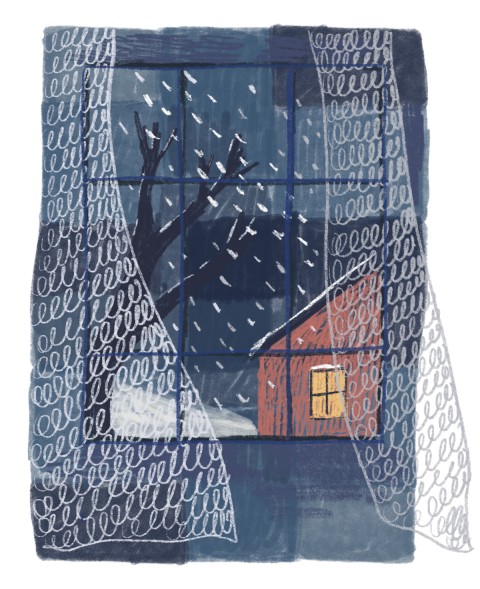Lessons from the land of lake effect snow
Life can be as unpredictable as the weather in upstate New York. But God’s steadfast love endures forever.

Illustration by Martha Park
Three little words, “lake effect snow,” still evoke fear and trembling in me. Until I moved to Ithaca, New York, for graduate school, I had never heard the phrase. The individual words sound relatively benign. A lake is a beautiful body of water, certainly in the Finger Lakes region of upstate New York. And snow is perfect weather in the winter, conjuring up images of fireplaces and cozy nights at home. But lake effect snow means cooler atmospheric conditions and cold air masses. It means that the five or six months between Halloween and Easter can involve an awe-inspiring amount of precipitation. Kids might go trick-or-treating in their cute costumes, or they might cover them up with down parkas, woolen mittens, and snow boots. Easter Sunday can mean a new dress and peep toe heels or knee-high boots and a long woolen coat. You never know how the winter season will begin or end.
I found the winter in upstate New York to be absolutely gorgeous, when it wasn’t absolutely inconvenient. I had to weigh the flight cancellations and dangerous roads alongside the crisp, clean air and the downhill sledding. I do have to give credit to lake effect snow for me finally finishing my dissertation. One Mother’s Day, while walking from my apartment to campus, I saw a few snow flurries in the still-frigid air. I was shocked: snow on Easter was possible, but in May? That just seemed cruel to a poor, overworked graduate student who longed for sun and warmth. I vowed then and there that it was time to finish my work and seek warmer horizons.
Twenty years removed from that late spring snowfall—which prompted my expeditious sprint of edits, revisions, and eventual dissertation defense—I realize that the land of lake effect snow was responsible for some of the most transformative years of my life. The realities of both graduate school and the winter weather forced me to slow down, read deeply, and savor the precious time of studying as my primary responsibility. Winter was not a dormant season but one of healing and recovery under a blanket of snow. Likewise, I was growing, learning, and being transformed during these years.





